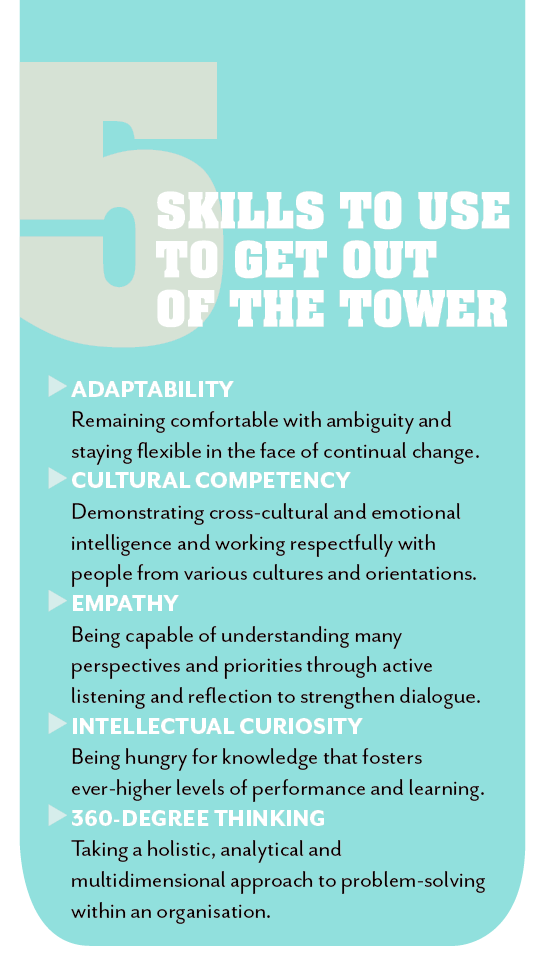It’s no secret – a skilled CEO is essential to driving business success. Indeed, your corporate acumen, strong experience, high standards, and long-term thinking are all part of what elevates you to the rank of high-achieving CEO. However, irrespective of personal attributes, there is a range of risks that can impact your ability to make the correct calls at the right times. One risk, often overlooked, is the potentially dangerous isolation you may encounter alongside the power and privilege of being a CEO.
The power of empathetic leadership
Sydney-based leadership specialist Muffy Churches says the so-called ‘ivory tower’ or ‘CEO bubble’ is one of the major challenges for any corporate leader to overcome because it can distance those in the top job from critical company decisions.
Churches, who has worked with corporate giants like Apple, Optus, Qantas and Telstra, says CEOs can end up isolating themselves, or become isolated by others. Both outcomes, she says, are potentially damaging for an organisation, whether it’s a large listed company or a small start-up.
One big danger, she says, is that staff become hesitant to interact openly and honestly with the CEO because they fear receiving negative feedback. “Employees tend to see CEOs in a position of power and therefore there’s a human tendency to sugarcoat the truth, issues and problems that may be bubbling up in the organisation,” Churches explains.
“Staff may choose not to mention certain facts to the C-suite person and to walk on eggshells around them. That’s especially so if they’ve got a history of outbursts, or are impatient and short-tempered.”
In this way, CEOs can often be to blame for disconnecting from staff, she says. Churches has found that as talented executives rise through the corporate ranks, they can tend to lose their empathetic and caring skills. This psychological shift, as Churches terms it, can have fallout for a company’s culture by isolating a CEO and damaging internal lines of communication.
“CEOs can come to feel like they must have all the answers and need to
be right all the time, so quite often they stop being curious. They don’t ask questions enough and they don’t listen enough,” she explains.
“They also tend to monopolise conversations around the board table, and come to dictate more than they collaborate. This is especially the case when they see themselves as very busy, important, and in an all-powerful position.” Churches’ observations are backed up by a wealth of international research showing the important role empathy, often defined as deep emotional intelligence, or EQ, plays in today’s competitive business world.

Indeed, recent research published by the University of Southern California points to empathy as one of five core attributes, along with cultural competency, intellectual curiosity, adaptability and 360-degree thinking, that are essential for a CEO’s success.
That’s because these attributes, according to the 2015 research, can help CEOs make better decisions and solve complex problems in an increasingly connected global economy, where transparent communication pays dividends.
Surveying the damage
Global expert in business storytelling Gabrielle Dolan suggests CEOs keen to stay connected with staff should, as a first step, run an anonymous employee-engagement survey. She says such surveys can be a powerful tool to help organisations gauge employee satisfaction, especially if they show “a decline in engagement levels the further you get away from the CEO and the executive leadership team”.
If that’s the result, Dolan advises taking some simple steps to get outside the C-suite ivory tower, including improving communication with staff. “One of the biggest ways CEOs can disconnect from their employees is in the way they speak. Too many CEOs stick to script, use corporate jargon and management speak. Every time we use pretentious language, we disconnect and isolate people and it creates a culture of mistrust,” Dolan reveals.
As well as the use of language, it is also beneficial if CEOs occasionally show staff their vulnerable side, she says. This helps because it shows what staff and the CEO have in common – their shared humanity.
“I have worked with many organisations to help them foster a culture of openness and transparency by teaching them how to share authentic personal stories,” Dolan says. “When leaders are prepared to show vulnerability by sharing stories, it can have a significant impact on the relationships. I have seen this work so many times.”
Are you trapped in the ivory tower?
Key questions to ask yourself
- How often do you get asked difficult or uncomfortable questions at work?
- In an average conversation at work, how many questions do you ask versus the number of statements you make?
- How often do you talk with people in your office who are confident to question your decisions?
- When was the last time you admitted you were wrong about something within the business?
- In a typical work week, how much time do you spend outside your headquarters or office?
CEO ‘touchpoints’ are critical
Leadership experts also stress the importance for CEOs to be visible on the shop floor. Dolan says this can boost staff morale and improve information flow. “CEOs should genuinely make an effort to move around and speak to their people, both announced and unannounced, as well as frequently. They should also be genuinely interested rather than treating it as a ‘tick the box’ exercise,” she adds.
Importantly, such visits need to be constructive, the business author says. This includes leaders being open to receiving staff criticism, which can then be used to improve processes as well as the CEO’s esteem among the workforce.
Dolan says, “CEOs need to thank people for their feedback, even when they disagree with it. It is important to be receptive and open to it, including being able to admit when they didn’t get it right – and to say sorry.”
Churches echoes this sentiment, pointing to the need for CEOs to prioritise some of their time to ‘touchpoint’ regularly with staff. She urges CEOs to take time to connect in person with staff, while being guided by the 80:20 Pareto Principle: “When a CEO goes out among their staff, it’s important for them to talk just 20% of the time, and listen for 80%. This is where they’re going to get a lot of information,” she says.
“When the CEO is out, curious and listening, all those people they touch in that process feel appreciated and part of the process. There’s more power in that than a lot of the other things that go on under the umbrella of ‘engaging culture’.”
Legal framework
Honest and transparent communication between CEOs and staff also relies on robust legal policies within organisations. That’s the view of Andrew Jewell, principal of Melbourne law firm McDonald Murholme, who says CEOs need to respect employees’ legal rights on complaints, investigation and discipline. Policies around complaints are important, he says, because they empower staff to have the confidence to speak up when concerned about workplace issues.
“Complaints need to be taken seriously and investigated thoroughly; however, the outcome can be flexible,” Jewell explains. “Policies and procedures are often seen as a legal necessity, but they can also be important for culture and for developing the management and staff relationships. If a company develops policies and these are applied consistently and genuinely, a positive culture can be nurtured.”
He says a CEO’s commitment to engaging constructively with staff should even extend to
union activity in the workplace. “The strongest message is to not see industrial relations as purely being a cost to a business,” Jewell says. “Unions act on behalf of employees, and industrial relations laws protect employees, so if CEOs accept that employees have a right to protect their interests, they can see the value of industrial relations.”







